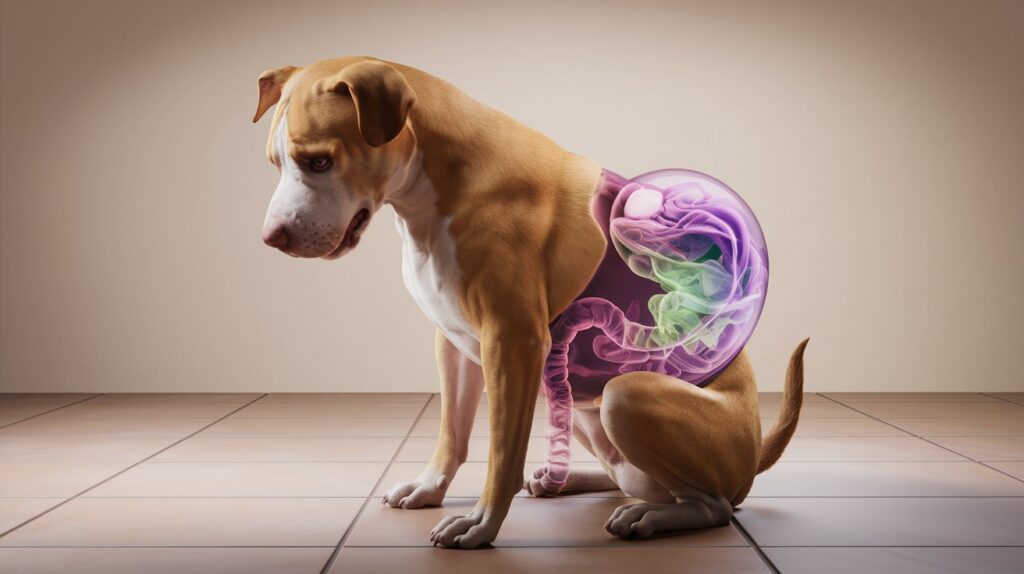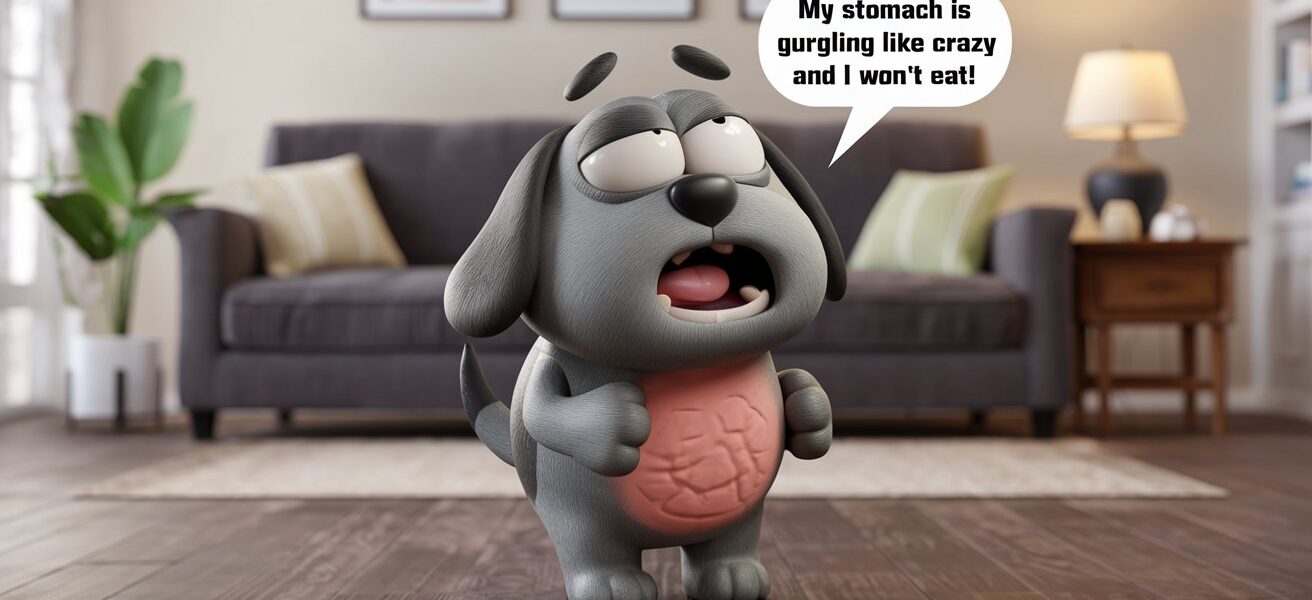- Homepage
- Health Disorders & Cure
- My Dog’s Stomach Gurgling Like Crazy and He Won’t Eat?
My Dog’s Stomach Gurgling Like Crazy and He Won’t Eat?

Table of Contents
ToggleMy Dog’s Stomach Gurgling Like Crazy and He Won’t Eat?
If your dog’s stomach is gurgling loudly and they refuse to eat, it could be due to various digestive issues. These gurgling sounds, known as borborygmi, often occur when gas or fluids move through the intestines. This could be triggered by mild causes like hunger or gas buildup, but it can also signal more serious problems such as gastroenteritis, pancreatitis, or intestinal blockage. If your dog’s stomach gurgling is persistent and they continue to avoid food, it’s best to consult a veterinarian to rule out any underlying health concerns.
What Is Stomach Gurgling in Dogs?
Stomach gurgling, or borborygmi, is the sound made when gas and fluids move through the intestines. While some gurgling is normal, excessive noise can be a sign that something isn’t quite right.
Normal vs. Abnormal Gurgling
It’s important to note that dogs, like humans, can have occasional stomach gurgling, especially when they’re hungry or digesting food. However, if the sounds are unusually loud or frequent, and your dog refuses to eat, it could be a sign of digestive trouble.
Understanding Your Dog’s Digestive System
Your dog’s digestive system is responsible for breaking down food, absorbing nutrients, and expelling waste. When this system is disrupted—due to anything from mild gas to serious illness—it can result in noticeable symptoms like gurgling noises and a lack of appetite.
Common Reasons Why a Dog’s Stomach May Gurgle
Hunger Pangs
Hunger is one of the most common causes of stomach gurgles. When your dog hasn’t eaten for a while, their stomach can become active in anticipation of food. However, if your dog is refusing to eat even though they’re hungry, something else could be going on.
Gas and Digestive Imbalance
A buildup of gas in the intestines can cause those loud gurgles. This can happen if your dog eats too fast, swallows air, or has trouble digesting certain foods.
Gastrointestinal Issues
Several gastrointestinal issues—such as infections, food intolerances, or parasites—can lead to both gurgling and a refusal to eat. These issues can irritate your dog’s stomach and intestines, making them uncomfortable.

When to Worry About Your Dog’s Gurgling Stomach
While occasional gurgling isn’t a cause for alarm, there are times when you should be concerned, especially if it’s accompanied by other symptoms.
Signs to Watch Out For
- Vomiting or diarrhea
- Lethargy or depression
- Drooling or lip-licking (signs of nausea)
- Bloating or a distended stomach
- Refusing food for more than 24 hours
How Long Has It Been Since Your Dog Ate?
If your dog hasn’t eaten for more than a day, it’s time to pay closer attention. Dogs can skip a meal occasionally without issue, but ongoing refusal to eat, especially paired with gurgling, might signal a more serious problem.
Possible Health Concerns Linked to Gurgling and Loss of Appetite
Gastroenteritis
Inflammation of the stomach and intestines is the main cause of Gastroenteritis. It can be caused by a viral or bacterial infection, or from ingesting something they shouldn’t have (like spoiled food). Common symptoms include vomiting, diarrhea, and stomach noises.
Bloat (Gastric Dilatation-Volvulus)
This causes loud gurgling sounds, and severe discomfort, and can even lead to death if not treated immediately. Dogs with bloat will often refuse food and may have a distended stomach.
Intestinal Blockage
If your dog has swallowed something they shouldn’t have—like a toy or a bone—it could cause an intestinal blockage. This can prevent food and gas from moving through the intestines, leading to gurgling and a refusal to eat.
Pancreatitis
Pancreatitis is inflammation of the pancreas and can cause stomach upset in dogs. It’s often triggered by fatty foods and can lead to vomiting, lethargy, and, you guessed it, a noisy stomach.
Home Remedies for Gurgling Stomach and Loss of Appetite
If your dog’s symptoms aren’t severe, you can try a few home remedies to settle their stomach and encourage them to eat.
Offering a Bland Diet
A bland diet of boiled chicken and rice or plain pumpkin can help soothe an upset stomach. These foods are easy to digest and can calm gastrointestinal discomfort.
Encouraging Water Intake
Make sure your dog stays hydrated, especially if they’ve been vomiting or have diarrhea.
Over-the-Counter Solutions (With Vet Approval)
Some over-the-counter remedies, like antacids or probiotics, may help with mild stomach upset.
How to Prevent Future Digestive Issues in Dogs
Diet Adjustments
Feeding your dog a well-balanced, consistent diet can help prevent future digestive troubles. Avoid giving them table scraps or fatty foods that can upset their stomach.
Feeding Routine and Portion Control
Stick to regular feeding times and control portion sizes. Dogs that eat too fast are more prone to gas and bloating, so try using a slow feeder if your dog tends to scarf down their food.
When to See a Veterinarian
If your dog’s gurgling stomach and lack of appetite persist for more than a day, it’s best to consult with a vet.
Symptoms That Require Immediate Attention
If your dog is showing severe symptoms like vomiting, diarrhea, lethargy, or a distended stomach, seek emergency veterinary care immediately. These could be signs of serious conditions like bloat or an intestinal blockage.
How the Vet May Diagnose the Problem
Your vet may perform a physical exam, take X-rays, or run blood tests to determine what’s causing your dog’s symptoms. Depending on the diagnosis, they may prescribe medication, recommend a diet change, or suggest further treatment.
Conclusion: My Dog’s Stomach Is Gurgling Like Crazy and He Won’t Eat.
A gurgling stomach in dogs is usually nothing to worry about, but when paired with a lack of appetite, it can signal a bigger problem. Pay close attention to your dog’s symptoms and don’t hesitate to seek veterinary care if needed. With proper care and prevention, you can keep your dog’s digestive system happy and healthy.
FAQs: My Dog’s Stomach Is Gurgling Like Crazy and He Won’t Eat
- What can I give my dog for a gurgling tummy?
You can offer a bland diet, such as boiled chicken and rice, or plain pumpkin. Ensure your dog stays hydrated and consult your vet for any over-the-counter remedies. - Should I be concerned if my dog’s stomach is making loud noises?
Occasional gurgling is normal, but if it’s loud, frequent, or accompanied by vomiting, diarrhea, or loss of appetite, consult a vet. - Can worms cause stomach gurgling in dogs?
Yes, intestinal worms can cause gurgling sounds as they disrupt the digestive system. A vet can diagnose and treat the issue. - Does pancreatitis cause stomach gurgling in dogs?
Yes, pancreatitis can cause stomach gurgling along with symptoms like vomiting, lethargy, and loss of appetite. It’s important to seek veterinary care.

Jahanzaib Kaleem is a passionate and knowledgeable pet writer and veterinarian dedicated to enhancing the well-being of pets and educating pet owners around the world. With years of experience in veterinary medicine and a deep love for animals, Jahanzaib combines his medical expertise with a flair for writing to deliver insightful and practical advice on pet care.





